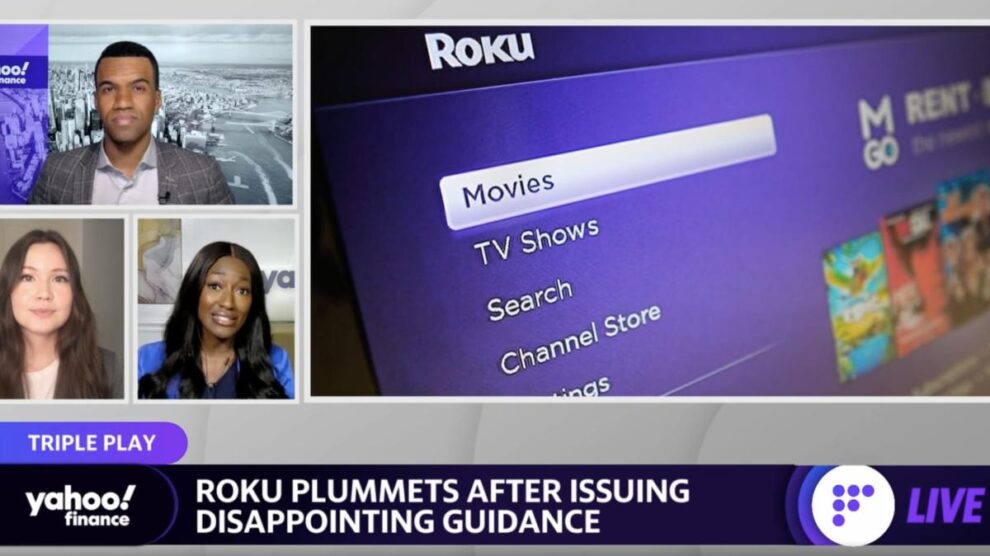
Yahoo Finance Live anchors discuss three stocks making moves on Friday: DraftKings, Alibaba, and Roku.
Video Transcript
EMILY MCCORMICK: It’s time now for our triple play when Rachelle, Brad, and I each break down one stock we’re watching this afternoon. And guys, I’ll start things off with DraftKings. Now the stock is sliding today after the sports betting company reported quarterly results and guidance that pointed to a slowdown in growth.
And I counted two main things that investors seem to be punishing DraftKings shares on from this earnings report. Now first, for the fourth quarter, monthly unique paid customers came in lighter than expected at 2 million. And second, DraftKings is forecasting a wider loss than expected this year and said that adjusted EBITDA losses would come in at as much as $925 million.
Now this is something that we’ve been watching for a while now in the sports betting world. The companies are prioritizing growth over profits and using promotions to try and bring on new customers, even if it impacts their bottom lines and path to profitability. But with DraftKings, it seems like they’re shelling out these promotions, posting wider than expected losses. And based on their latest quarterly customer counts, still not exceeding estimates in terms of user growth. So definitely a difficult combination for investors to be digesting at this point.
BRAD SMITH: Yeah, and I think for–
RACHELLE AKUFFO: I mean, it’s interesting because usually, when you think about gambling, it’s supposed to be the house that always wins, but that doesn’t seem to be the case with sports betting.
As you mentioned, all these promotions, a lot of people betting and doing very well off of it, and even as you look at the sort of choppiness in the overall stock market, I mean, when they were looking at some of the– the fact that they were looking at the EBITDA guidance more overshadowing this Q4 revenue guidance, the CEO is saying, look, it’s a reflection of just an unstable stock market. And he seems to have a lot of faith in the long-term. But we’ll have to see if, you know, coming off the heels of something like the Super Bowl, we’ll see what happens with other sports betting companies as well.
BRAD SMITH: Yeah, that’s spot on. And when we think about how the handle doesn’t necessarily equate into direct revenue, at the end of the day, it’s going to come down to what the marketing spends look like, are the investors comfortable with how much they’re going to continue to spend, as you laid out a moment ago, Emily, and then additionally, with regard to the states that come online, do those states that do activate some of their mobile betting options, do they do so, so quickly and in such a concerted manner that now you’ve got a company in DraftKings and many of their competitors that now have to go full scale blitz with the amount of spending? And that far exceeds some of the expectations from investors as well.
So that’s something that’s perhaps a headwind risk, but it’ll probably come a little bit more piecemeal, something that perhaps they can expect, or at least, anticipate and better forecast for as well.
RACHELLE AKUFFO: Now one of the stocks that I’m watching today is Alibaba, also known as BABA. We saw that it was one of several Chinese e-commerce platforms that was put on the US trade representative’s notorious markets list. And that’s for companies that allegedly sell or facilitate the sale of counterfeit goods. And so we know that they also took a hit from Chinese regulators, their Meituan delivery service being asked to reduce delivery fees, along with a lot of other delivery companies there. So we’ve seen BABA shares down 50% over the last year. And by some analysts’ estimates, it still may not have hit its bottom yet.
BRAD SMITH: Yeah, taking a look at Alibaba and you looked at the past year timeline, and what’s really coming to play for Alibaba over that period of time is also looking at where some of the listings, both internationally and on the home front, but especially in China, where many of them have been looking at delisting some of their shares in US markets and having to list primarily in China, what impact that has for the broader and more global kind of investor constituency that they were going after previously when they did go public back in 2014.
And so with all of that in mind, I think for e-commerce as a whole, Alibaba, what they’ve continued to try and show is that they can be and continue to be widely profitable on the e-commerce, while also trying to build out their Alibaba Web Services equivalent to AWS, if you will. And all of that in play still has this overhang of what the Chinese government may do and that tech lash that’s clearly been taking place within the region as well.
EMILY MCCORMICK: Right, and absolutely. If we think about some of the overhang that has been weighing on Alibaba shares over the past year, Rachelle, you were talking about that more than 50% decline that we’ve seen in the stocks. It is, to Brad’s point, the Chinese regulatory overhang. It’s also the zero COVID policy that we’ve seen in China that has really weighed on economic growth there and impacted the consumer and the consumption that we’ve been seeing in that region, which, of course, comprises so much of Alibaba’s overall sales.
And it’s also, of course, the US regulatory side, when it comes to that potential specter of delisting here, Brad, something else that you were also talking about. So I think this has just been an incredibly difficult environment for Alibaba and many of these Chinese internet giants to be operating in. And not to mention that in terms of where growth had been for e-commerce companies from the peak during the pandemic, already seeing a slowdown on that front, so really just a multitude of headwinds here for this company and its ilk.
BRAD SMITH: Absolutely. Well, take another look here at– and I wish I picked a positive stock for us to end on. I did not. I’m sorry. I actually picked Roku today. It’s tracking for its worst day as a publicly traded company here. And so taking a look at shares, you’re seeing them down right now by about 23%. This is on the back of earnings that we broke down yesterday after the market closed.
And particularly, one of the things sticking out to investors, of course, is going to be that drawdown in the growth rate when we think about the number particularly that they’re forecasting for, going forward from this particular time. They’re forecasting revenue growth of 35% for 2022. Let’s remember, in 2021, they saw 55% revenue growth. If anything, for Roku, what they tried to do over these past two years for certain was shore up the coffers of content, making the strategic acquisitions of some of those Quibi titles that were not necessarily going well for Quibi at all, to the point where they did have to offload or license out all of them.
And so with all of that in mind, it comes squarely down to, for me, at least, in my perspective, what Roku is going to do with its platform continuing to have some of the manufacturing partnerships that it does, being able to be automatically on some of the devices that make their way into homes, how Roku can continue to exercise that hub and making sure that the content is prominent within there. But at the same time, I think investors really latching on to not just the earnings and the revenue itself, but also what the company is signaling going forward from here and perhaps that deceleration of growth, too.
EMILY MCCORMICK: Right, Brad, and speaking of that outlook, I think what perhaps took a lot of investors by surprise here was the extent to which Roku has been exposed to the supply chain disruptions that we’ve been seeing across the economy. Because we think of Roku as being the streaming player, but of course, it does have hardware on the TV side. And Roku’s chief financial officer, Steve Louden, did tell Bloomberg in an interview that he sees supply chain disruptions relating to the TV market persisting into 2022. So really something that we’re going to continue seeing over the course of this year.
And not only on the hardware side, but we’re also seeing supply chain disruptions and some of the disruptions to Roku’s customers on the advertising side being impacted by this. It’s impacting their ad spend that they’re actually putting into Roku. So again, a number of concerns here for Roku that are really weighing on the stock post-earnings results yesterday.
RACHELLE AKUFFO: And really adding to that, you have to ask yourself, I mean, is this overestimation coming home to roost? I mean, Roku is up against some of the biggest competitors. You have Amazon, Apple, Netflix, and Google, who have the added bonus also of having stronger content offerings, and of course, they offer more beyond subscriptions and software. They also have a lot more money, and they have a deeper pool of engineers.
And so as you mentioned, if you couple that with things like supply chain issues, I think Roku might be in a bit of trouble here in terms of how it’s going to compete going forward. Now it has been doing well in some of its sectors, but when you think about who it’s up against and how things might perhaps change as people sort of return to work and maybe not at home as much, we’ll have to see if they can keep up with the big boys.
BRAD SMITH: Yeah, they tried to be a standalone solution and formulate the right partnerships along the way, but when you’re going up against some of those ecosystems that you mentioned, Rachelle, certainly an uphill battle there for sure. We’re going to keep a close eye on all of these companies that we brought to your attention going into the close. Switching gears, though, in a key week for economic housing data, homebuilder confidence, it declined, while existing–










